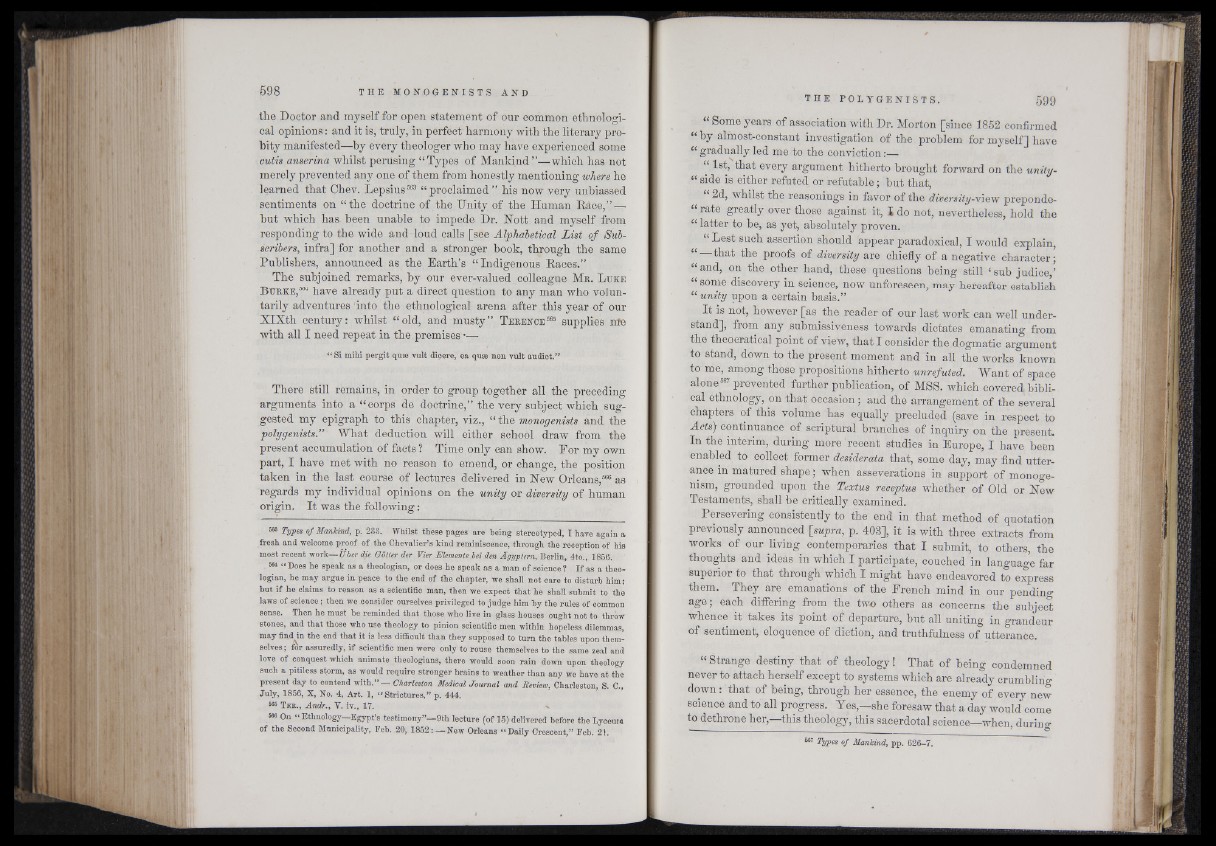
the Doctor and myself for open statement of our common ethnological
opinions: and it is, truly, in perfect harmony with the literary probity
manifested—by every theologer who may have experienced some
cutis anserina whilst perusing “Types of Mankind”—which has not
merely prevented any one of them from honestly mentioning where he
learned that Chev. Lepsius563 “ proclaimed ” his now very unbiassed
sentiments on “ the doctrine of the Unity of the Human Räce,”—
but which has- been unable to impede Dr. Hott and myself from
responding to the wide and loud calls [see Alphabetical List of Subscribers,
infra] for another and a stronger book, through the same
Publishers, announced as the Earth’s “ Indigenous Races.”
The subjoined remarks, by our ever-valued colleague M e . L uke
B u r k e ,5“ have already put a direct question to any man who voluntarily
adventures 'into the ethnological arena after this year of our
XlXth century: whilst “ old, and musty” T e r e n c e 565 supplies nie
with all I need repeat in the premises’ ■—
“ Si mihi pergit quse vult dicere, ea quae non yult audiet.”
There still remains, in order to group together all . the preceding
arguments into a “ corps de doctrine,” the very subject which suggested
my epigraph to this chapter, viz., “ the monogenists and the
polygenists.” What deduction will either school draw from the
present accumulation of facts? Time only can show. For my own
part, I have met with no reason to emend, or change, the position
taken in the last course of lectures delivered in Hew Orleans,566 as
regards my individual opinions on the unity or diversity of human
origin. It was the following:
663 Types of Mankind, p. 233. Whilst these pages' are being stereotyped, I have again a
fresh and welcome proof of the Chevalier’s kind reminiscence, through the reception of his
most recent work—über dje Göller der Vier Elemente bei den Ägyptern, Berlin, 4to., 1856.
364 “ Does he speak as a theologian, or does he speak as a man of science ? If as a theologian,
he may argue in peace to the end of the chapter, we shall not care to disturb him;
but if he claims to reason as a scientific man, then we expect that he shall submit to the
laws of science; then we consider ourselves privileged to judge him by the rules of common
sense. Then he must be reminded that those who live in glass houses ought not to throw
stones, and that those who use theology to pinion scientific men within hopeless dilemmas,
may find in the end that it is less difficult than they supposed to turn the tables upon themselves
; for assuredly, if scientific men were only to rouse themselves to the same zeal and
love of conquest which animate theologians, there would soon rain down upon theology
such a pitiless storm, as would require stronger brains to weather than any we have at the
present day to contend with.” -^.Charleston Medical Journal and Review, Charleston, S. C.,
July, 1856, X, No. 4, Art. 1, “ Strictures,” p. 444.
665 Te b ., Andr., V. iv., 17. -
we On “ Ethnology—Egypt’s testimony”—9th lecture (of 15) delivered before the Lyceum
of the Second Municipality, Feb. 20, 1852: — New Orleans “ Daily Crescent,” Feb. 21.
“ Some years of association with Dr. Morton [since 1852 confirmed
“ by almost-constant investigation of the problem for myself] have
“ gradually led me to the conviction:—
“ 1st, that every argument hitherto brought forward on the unity-
“ side is either refuted or refutable; but that,
2d, whilst the reasonings in favor of the diversity-viQw preponde-
“ rate greatly over those against it, I do not, nevertheless, hold the
“ latter to be, as yet, absolutely proven.
“ Lest such assertion should appear paradoxical, I would explain,
“—that the proofs of diversity are chiefly of a negative character;
“ and, on the other hand, these questions being still I sub judice,’
I some discovery in science, now unforeseen, may hereafter establish
“ unity upon a certain basis.”
It is not, however [as the reader of our last work can well understand],
from any submissiveness towards dictates emanating from
the theocratical point of view, that I consider the dogmatic argument
to stand, down to the present moment and in all the works known
to me, among those propositions hitherto unrefuted. Want of space
alone567 prevented further publication, of MSS. which covered biblical
ethnology, on that occasion; and the arrangement of the several
chapters of this volume has equally precluded (save in respect to
Acts) continuance of scriptural branches of inquiry on the present.
In the interim, during more 'recent studies in Europe, I have been
enabled to collect former desiderata that, some day, may find utterance
in matured shape; when asseverations in support of monoge-
nism, grounded upon the Textus receptus whether of Old or Hew
Testaments, shall be critically examined.
Persevering consistently to the end in that method of quotation
previously announced {supra, p. 408], it is with three extracts from
works of our living contemporaries that I submit, to others, the
thoughts and ideas in which I participate, couched in language far
superior to that through which I might have endeavored to express
them. They are emanations of the French mind in our pending
age; each differing from the two others as concerns the subject
whence it takes its point of departure, but all uniting in grandeur
of sentiment, eloquence of diction, and truthfulness of utterance.
“ Strange destiny that of theology! That of being condemned
never to attach herself except to systems which are already crumbling
down: that of being, through her essence, the enemy of every new
science and to all progress. Yes,—she foresaw that a day would come
to dethrone her,—this theology, this sacerdotal science—when, during
667 Types of Mankind, pp. 626-7.